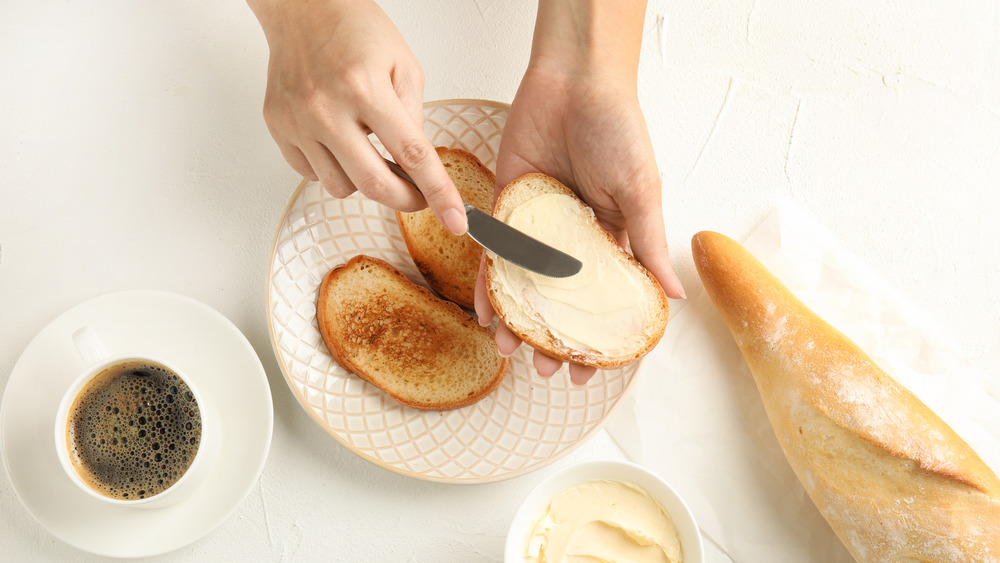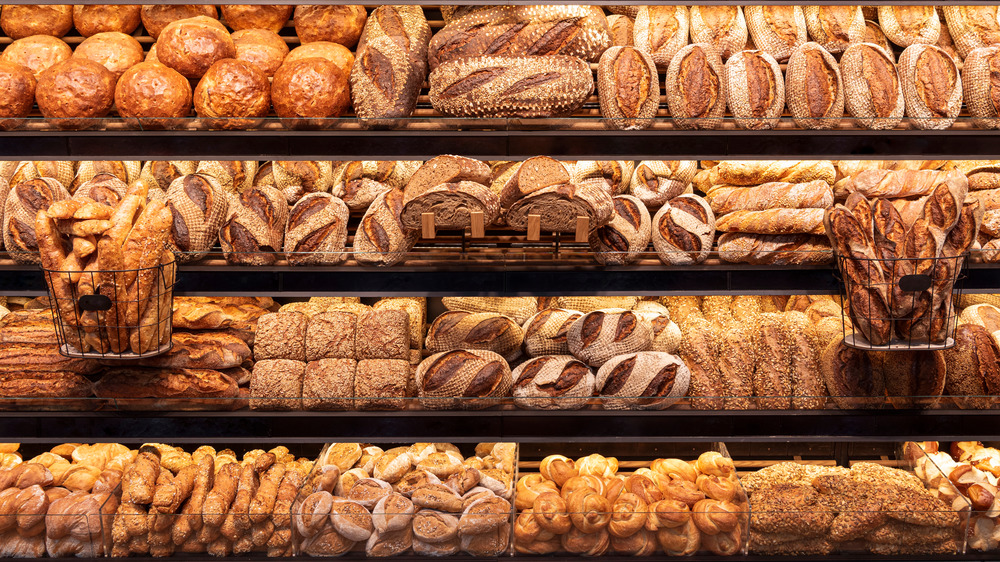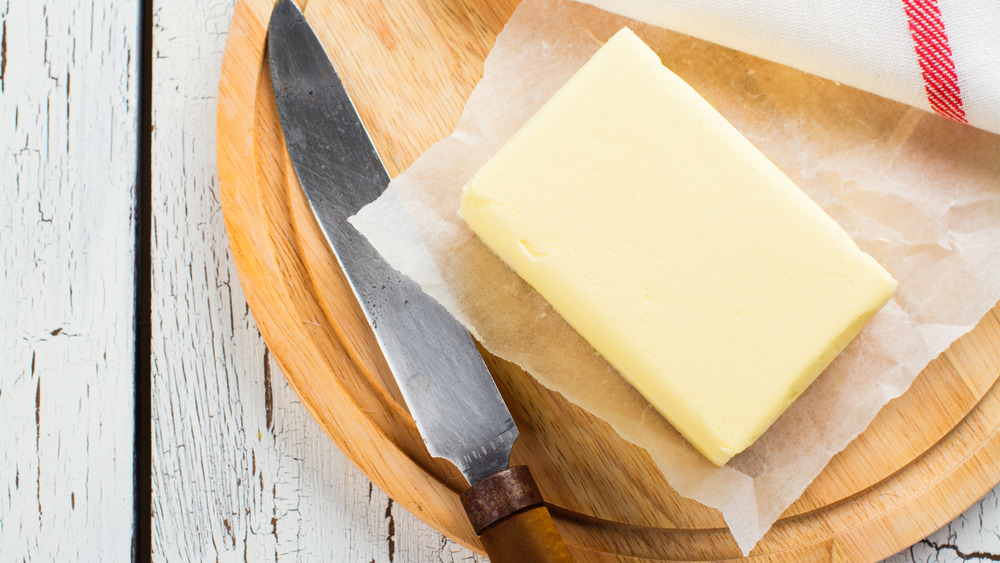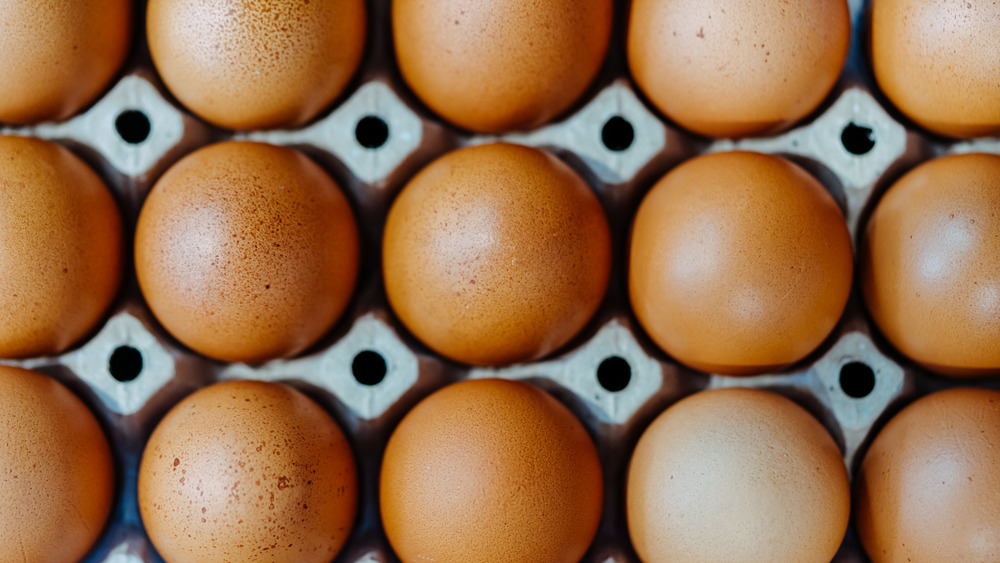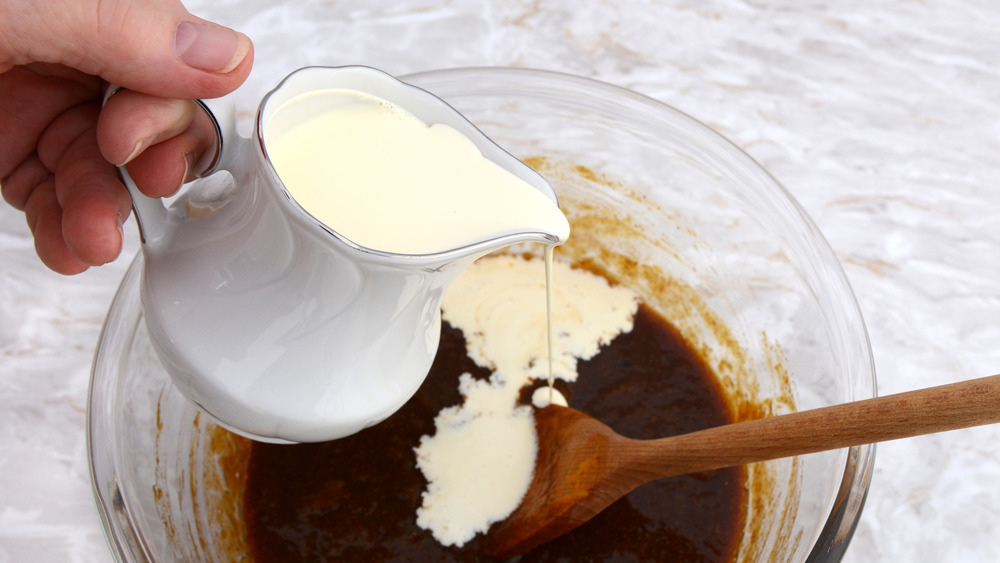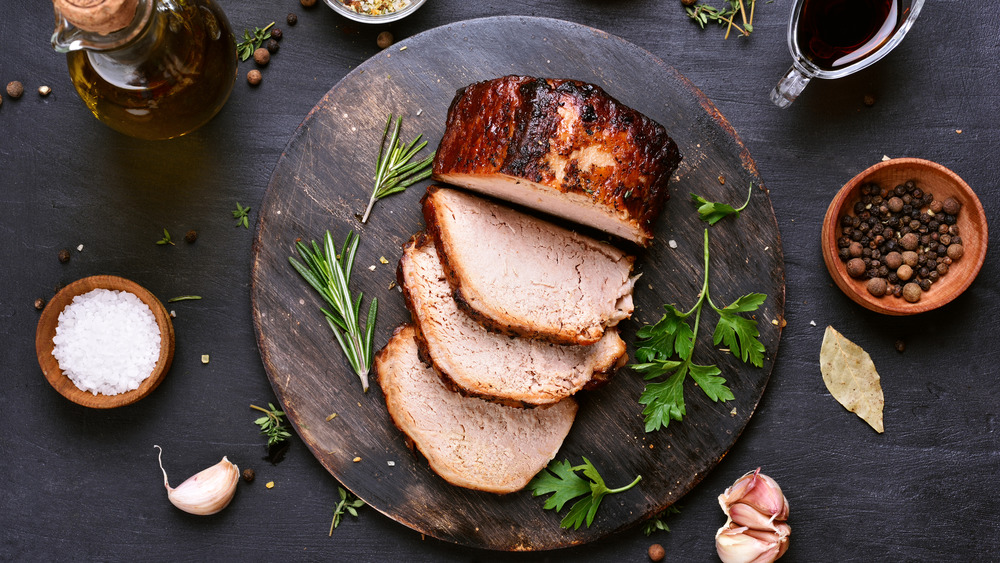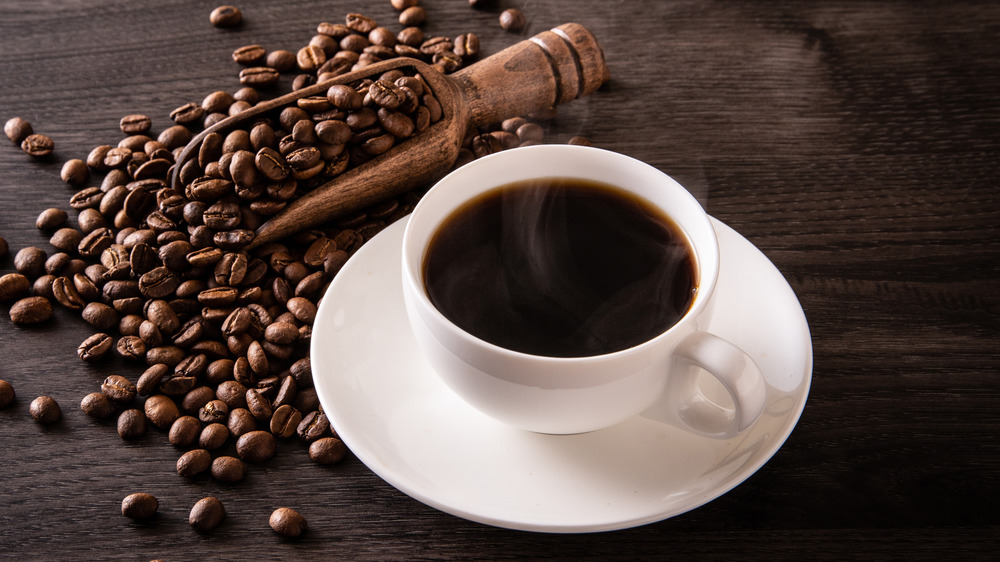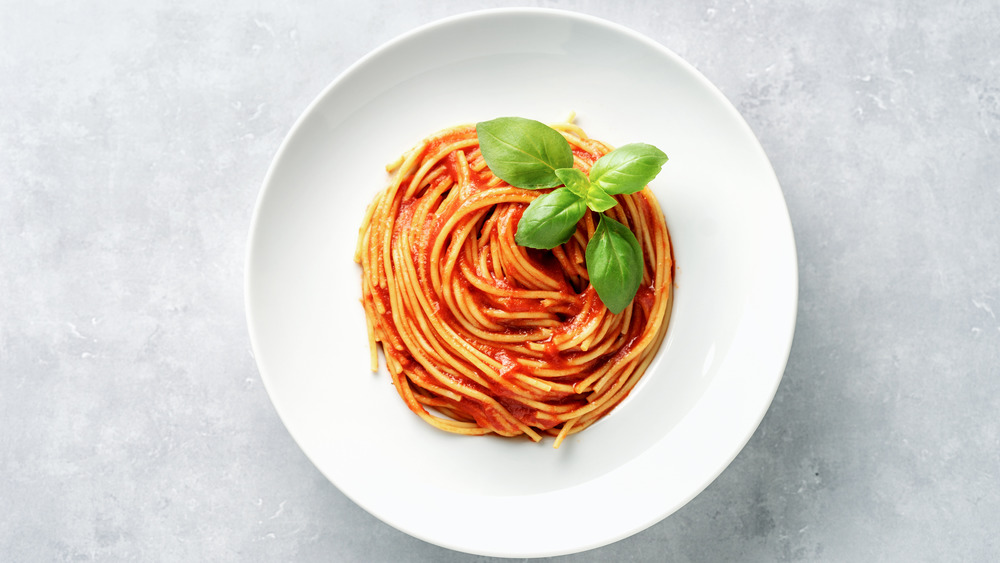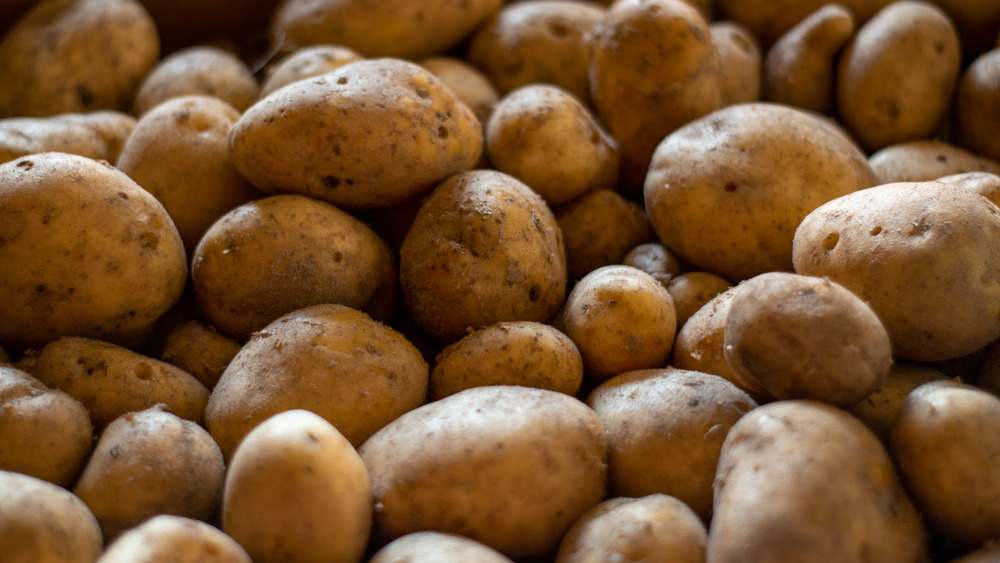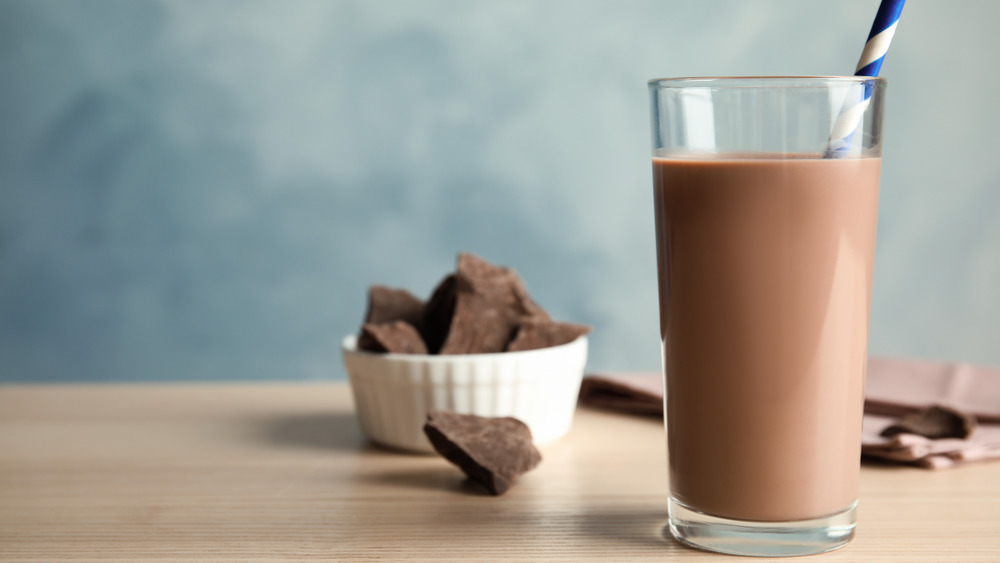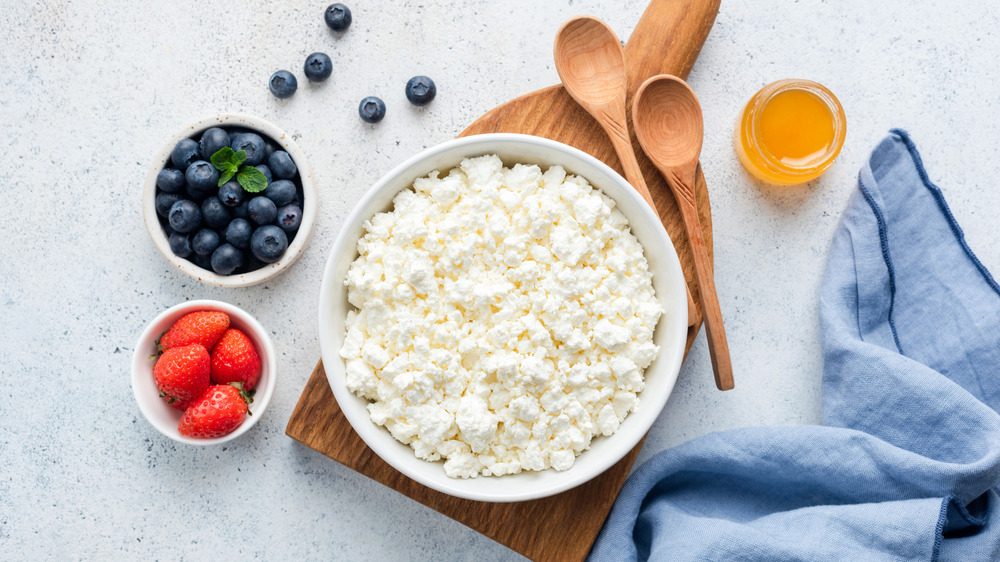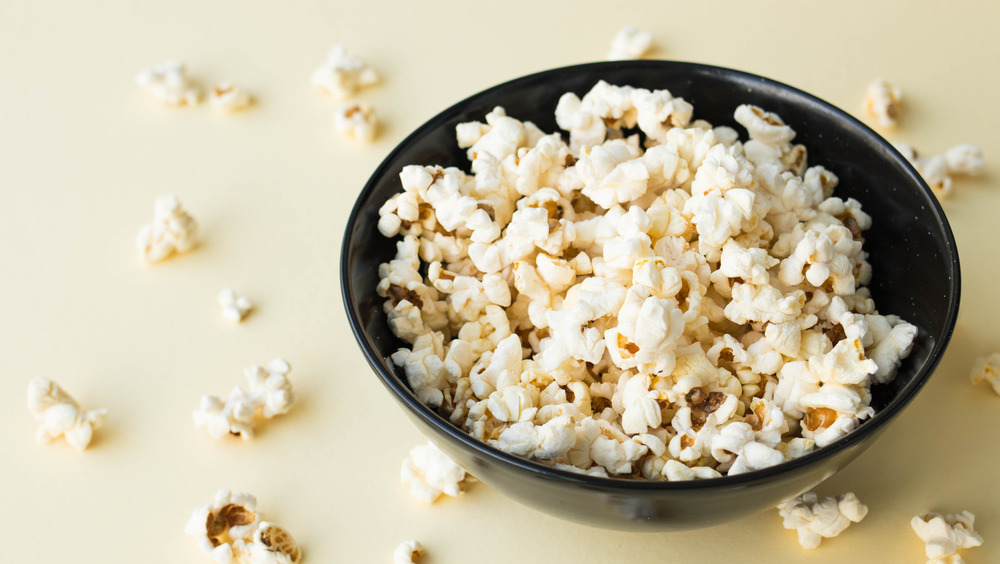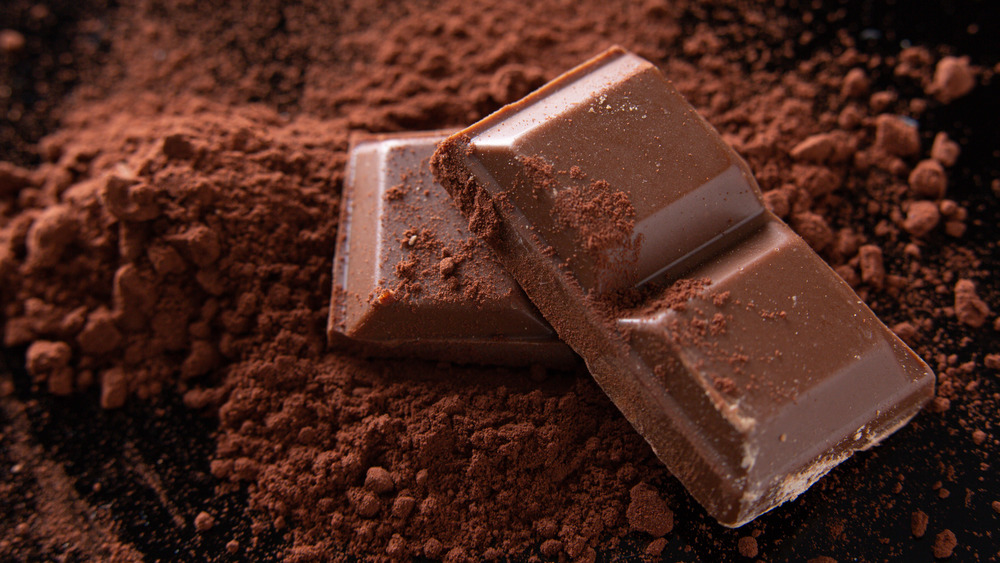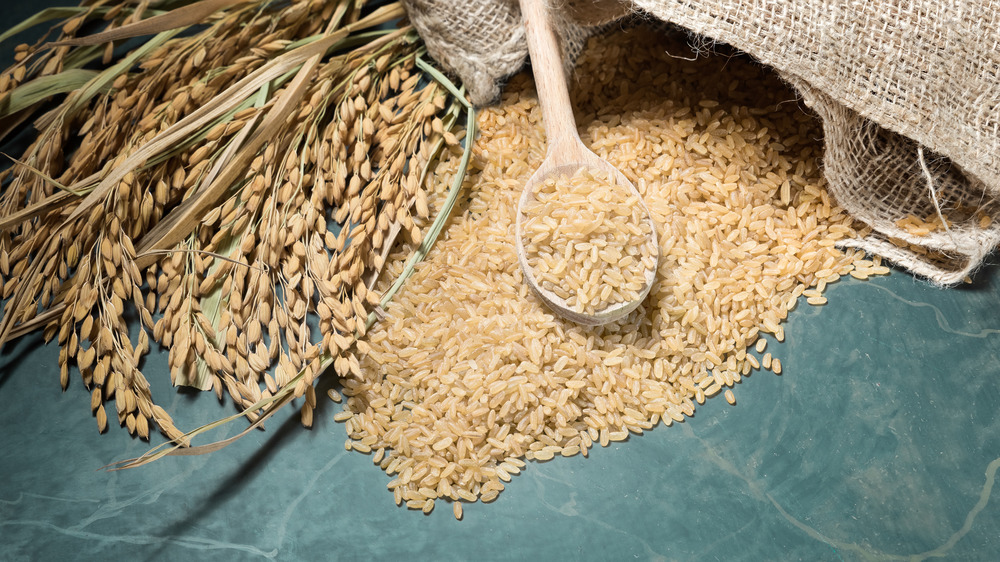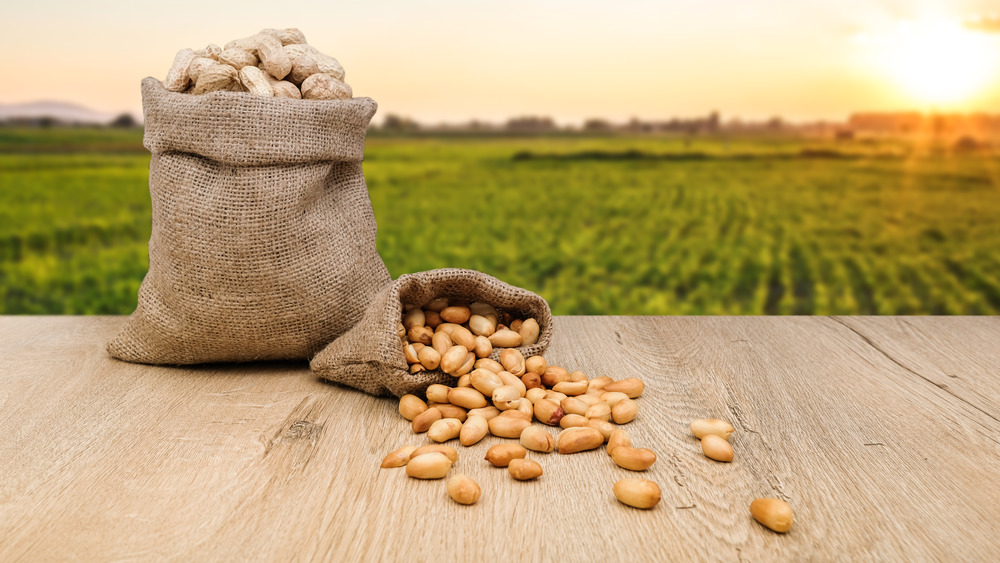'Unhealthy' Foods That Can Actually Help You Lose Weight
Sometimes, it can feel like everything we eat is unhealthy or "bad" for us. Ahead of 2021, 44 percent of Americans who made New Year's resolutions promised to shed some pounds (via YouGov). Trying to figure out the right foods to help achieve a slimmer waistline feels like a constant endeavor, and options can feel pretty limited.
That's why it's hardly surprising that people are pretty much always looking for new ways to lose weight — and the diets out there can get pretty wild. Between the "vision diet" (eating everything while wearing blue-tinted glasses), the "ice-cream cleanse" (eating five pints of specialized ice cream daily), and the "baby food diet" (eating jars of baby food and just one regular meal per day), there's truly any number of ways to lose weight (via Cosmopolitan).
However, these strange diet trends can sometimes increase our fear factor of certain foods or even of food as a whole. And actually, some foods that we consider to be "bad" aren't actually unhealthy when they exist in a certain dietary context. Join us as we investigate some of these seemingly unhealthy foods that could actually help you lose weight.
You don't have to swear off bread
The holy grail of carbs, bread is often considered the mortal enemy of weight loss. However, certain choices could keep you trim. According to Livestrong, some kinds of bread, such as wheat, can not only help with weight loss, but can help to protect your heart health by reducing the risk of coronary heart disease, as well as certain types of cancer. Whole wheat bread has a vastly different composition than simple white bread, which is high in highly-processed, simple carbs that can cause difficulties with weight loss.
Whole grain, or wheat, bread, on the other hand, contains more vitamins, minerals, and fiber than white bread — all of which can contribute to weight loss. According to WebMD, eating whole grains can be a great strategy for weight loss, with one study finding that people consuming a lower-calorie diet that incorporated whole wheat bread lost more belly fat than those eating refined grains.
You don't have to worry too much about butter
Although butter is the last thing we would picture being good for the waistline, eating it in moderation could help you maintain or even lose weight. While butter is high in calories and saturated fat, there's fair evidence that eating high-fat dairy products like butter can reduce your risk of obesity when incorporated into a healthy, balanced diet, according to WebMD.
Dr. Wendy Bazilian, registered dietitian nutritionist and author of the Eat Clean, Stay Lean series, believes the fear of butter is overplayed. As she said in an interview with Eat This, Not That, "If you eat an overall nutritious menu daily including fruits and vegetables at every meal, fewer ultra-processed foods, smart proteins, whole grains, and healthy fats at meals and snacks within portions that help maintain health and weight, then the amount of butter [in your diet] should sort itself out. You don't have to worry too much about it."
Plus, butter in combination with other ingredients may promote weight loss. Take bulletproof coffee, for example. According to Healthline, adding butter to your daily coffee may help suppress your appetite, meaning you'll eat less.
Eggs can boost your metabolism
Eggs are generally accepted as healthy these days, which is why their place on this list might surprise you. A lot of people, however, veer away from eggs when trying to lose weight. This is because eggs have a relatively high fat content, as Good Housekeeping revealed. Thus, they've earned a reputation as a dieter's worst nightmare.
It's important to remember, though, that when we think of eggs as fattening, we're usually actually thinking of unhealthy food combinations made with eggs, like a sausage, egg, and cheese muffin or scrambled eggs and bacon. Those additions will, of course, be more fattening than just a humble egg.
By their own merit, however, eggs could be your best friend for weight loss. As Medical News Today pointed out, eggs can not only promote a feeling of fullness due to their fat and protein content, but they may also help to speed up your metabolism — meaning you'll burn calories quicker, leading to increased weight loss. If you're trying to shed some pounds, don't be afraid of eggs.
Full-fat dairy is not the enemy
When we try to lose weight, we often say goodbye (while shedding a tear or two) to high-fat dairy products used in sweet desserts and creamy sauces. Although cutting back on excess calories makes sense for weight loss, full-fat dairy products could help you more than you might think.
Harvard Health Blog asserts that eating full-fat dairy can actually help reduce the risk of weight gain. This is because the fat keeps us feeling fuller longer, meaning we wind up eating less. The publication also pointed out that restricting fats too much in diets may be an inhibitive strategy when it comes to weight maintenance. Yes, fats are not the enemy we often perceive them to be. When full-fat dairy is eaten in moderation, or when following a diet that focus on higher fat intake and lower carbs (like the keto diet), they can help a person lose weight.
Depending on the type you choose, pork can help you lose weight
Sausage, bacon, ham: all delicious pork products, but not exactly ones you'd eat while trying to lose weight, right? When it comes to pork in general, though, it may not be as unhealthy as you'd immediately think. In fact, eating the right type of pork can help with weight loss.
According to a study published in Nutrients, participants who were eating up to 1 kilogram (2.2 pounds) of fresh lean pork per week over six months' time saw "significant reductions" to their body fat percentage, fat mass, abdominal fat, and overall weight.
The problem with pork comes not from the protein, which can actually be beneficial for weight loss, but rather how pork is processed. Pork products, like sausages, have an unbalanced macronutrient profile that can be disadvantageous for weight loss. They may also contain empty calories. According to Verywell Fit, this is a common problem with sausages, which can often contain added sugar and unhealthy trans or saturated fats. When choosing pork, opt for leaner cuts and fresh sources. They'll be kinder to your body and maybe even help you lose a few pounds.
Coffee promotes weight loss
If, like us, you find it tricky to stir into action without a daily cup of coffee, you may be pleased to know that you can keep your daily cup of joe and still lose weight. Although coffee sometimes gets a bad rap in the dietary department, it's usually due to what is added to coffee: sugar, artificial sweeteners, cream, et cetera. However, black coffee only contains around 5 calories and 0 fat, according to the Mayo Clinic. But once you start adding extras likes syrups and creamers, your cup's caloric content could skyrocket.
Limiting what you put in your coffee can indeed promote weight loss, but the coffee itself also plays a role. One study found that drinking multiple cups of caffeinated coffee a day can help with a reduction in fat levels (via WebMD). In fact, participants who drank 4 cups a day for over six months lost 4 percent of their overall body fat. This could be due to the caffeine content in coffee promoting a faster metabolic reaction, resulting in more calories burned. If you're looking to shed some pounds, warm up that pot pronto!
Pasta has a low glycemic index
It might be a little difficult to believe this, but a bowl of spaghetti might not be the worst thing in the world for your weight-loss goals. It all comes down to the glycemic index. The glycemic index (GI), according to the Mayo Clinic, refers to the effect that eating certain carbohydrates has on our blood sugar levels. Eating low-GI foods will cause less of a rise in blood glucose. Conversely, eating high-GI foods will cause your blood glucose to rise and fall more suddenly — and this can lead to weight gain.
A low glycemic index is considered anything from 1 to 55. Interestingly, pasta falls within the low range. For example, spaghetti has a GI of 42 (via Harvard Health Letter). While you shouldn't eat bowl after bowl of spaghetti, this pasta may help you reach your weight goal when eaten in moderation. This was confirmed by a study published in BMJ Open, which found that "pasta in the context of low-GI dietary patterns did not contribute to weight gain, resulting in a significant weight loss of −0.63 kg [1.39 pounds] when compared with diets higher in GI over a median follow-up of 12 weeks." Music to the ears of all you linguine lovers out there.
Potatoes will keep you fuller longer
Potatoes have long been considered public enemy number one when it comes to weight loss. However, potatoes aren't as unhealthy as they seem, thanks to how satiated they can make you feel. Satiety — the quality of feeling full and satisfied after a meal — can have a powerful impact on the way that we eat (via British Nutritional Foundation). If we feel more satiated, we're less likely to eat more at the next meal or snack between meals, meaning fewer calories ingested and less weight gain.
A study published in the European Journal of Clinical Nutrition confirmed how great potatoes are at keeping us full. Researchers developed a "satiety index" and determined that boiled potatoes had the highest satiety index score of the 38 foods tested. So even though buttery mashed potatoes by the bucketload might not be the best choice for weight loss, potatoes in their simplest form can be an excellent choice to help you remain full and control your appetite.
Chocolate milk may reduce your risk of obesity
It sounds bizarre, but chocolate milk, in all its sweet glory, is indeed helpful for weight loss. Bear with us, we'll explain. Although chocolate milk can often be high in sugar and fat, it has several aspects which makes it beneficial for weight loss or weight management. As chocolate milk is comprised mainly of milk, it delivers a hefty amount of calcium, which, as WebMD says, can reduce the risk of obesity.
Plus, some forms of chocolate milk are particularly useful as a post-workout drink. As a study in Medicine and Sport Science indicates, low-fat chocolate milk has an ideal carb-to-protein ratio, mirrored in many commercial sports recovery beverages, that can render it useful for consumption after exercise for muscle recovery. This makes it a great fit for your fitness or weight loss plan. It's important to keep in mind, though, that this pertains to low-fat chocolate milk only. Drinking full-fat, full-sugar chocolate milk all the time may not be so great for your gut.
Certain types of cheese can help you meet your weight-loss goal
Cheese may not be the "best" diet food, but nor is it the killer of weight loss progress that you might think it is. It really all depends on the balance of cheese in your diet, as well as what kind of cheese you eat.
According to Healthline, there are hundreds of types of cheese. Some of them can not only be a great source of protein and calcium, but they can even help with weight loss. Cottage cheese, for example, is high in protein and relatively low in calories, making it a great diet choice. Other cheeses, like feta, have a relatively favorable ratio of fat to protein and contain certain acids which have been shown to decrease body fat.
If you're opting to eat cheese while attempting to lose weight, go for a cheese that has a higher protein content. As the National Academy of Sports Medicine explained, eating protein on a diet designed for weight loss helps keep you feeling full longer and preserves lean body mass.
Popcorn can be a healthy snack
Popcorn can often come covered in butter and salt, and when distracted by a movie, you can easily funnel handful after handful into your mouth. "Loading butter on popcorn adds a ton of extra calories and fat which significantly lower the food's benefits," nutritionist Lisa Richards told Eat This, Not That. "Adding sodium-rich flavorings can make popcorn unhealthy as well." However, if you eat popcorn without all the extras, it can be a pretty great snack for weight loss.
As Eating Well pointed out, popcorn is not only low in calories — with 3 cups of popcorn coming in at just 100 calories — but is also a whole grain that delivers a large amount of fiber. Plus, popcorn is an excellent source of antioxidants called polyphenols. This means that it's not only good for your diet plan, but it can also help to preserve your heart health and lower your risk of certain cancers.
Dark chocolate may help control your appetite
It gives us the greatest joy to tell you that, yes,despite chocolate's reputation as pretty much the worst food you can eat for weight loss, it may be able to help you lose weight! There is a bit of a caveat here, however: It comes down to the type of chocolate you eat. Many commercial chocolates can be loaded with sugar and fat, and thus lead to weight gain, according to the Mayo Clinic. Dark chocolate, on the other hand, might just control your appetite better.
A study published in Nutrition & Diabetes found that when participants ate dark chocolate instead of milk chocolate, they "felt more satiated, less hungry, and had lower ratings of prospective food consumption." This is potentially because, as Everyday Health explained, eating dark chocolate may make hormones tell your brain that you're full. In small quantities (moderation is key!), dark chocolate could be useful in suppressing your appetite and therefore controlling the amount you eat.
Choose brown rice over white rice to lose weight
White rice isn't the most diet-friendly of choices. While it's certainly delicious, it can hinder weight-loss goals. However, this isn't true of all types of rice. While white rice is a refined grain — that is, it's been stripped of some of its nutrients — brown rice is a whole grain. It contains a high level of fiber (3.5 grams per cup), which could contribute to its effectiveness in weight loss, according to Healthline.
As Harvard Health Blog pointed out, increasing your fiber intake is one of the best things you can do in your effort to lose weight. A study cited by the publication tracked individuals who changed their diets by simply adding more fiber, and significant weight loss across the board for participants.
Brown rice also boasts a low glycemic index, so eating it won't cause your blood sugar to spike. Spikes in blood sugar can contribute to not only weight gain, but increased risk of diabetes (via WebMD). Instead, brown rice can help keep your blood sugar — and your weight — stable.
Nuts can lower your risk of obesity
A pack of peanuts doesn't exactly scream "healthy." But nuts are not be as "bad" as you might imagine. In fact, they could be one of your greatest allies in weight loss. Although nuts are high in fat, you don't need to fear them. Eating them won't necessarily cause weight gain — as long as they're a part of a balanced diet.
According to Healthline, the high level of unsaturated fats and protein content in nuts can help to suppress appetite, Multiple studies cited by the publication show the potential for nuts like almonds, pistachios, and peanuts to aid with weight loss.
Besides, eating more nuts can help reduce long-term weight gain. As one large-scale study published in BMJ Nutrition, Prevention & Health found, individuals who ate nuts more regularly demonstrated a lower risk of obesity, and gained less weight over time. Add to this the density of nutrients and antioxidants that are found in nuts, and you've found a winning snack for weight loss.

